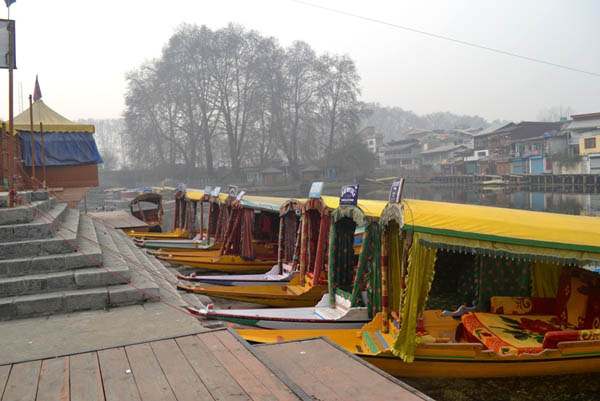JK News Today
Saleem Qadri
Srinagar, December 1
It is extreme cold with fog hovering over the world famous Dal Lake, Shikara owners sitting idle on the Boulevard road and the stagnant water waits for Shikaras to shake it and bring back its glory which has diminished since July 8, the day when Kashmir valley was shut after killing of militant commander of Kashmir’s Hizbul Mujahiddin, Burhan Wani.
Since then every type of business in the valley has come to standstill and tourism sector is one of the biggest sufferer where the local populace, whose economy depends on the arrival of tourists from other states of the country as well as from the rest of the world. Multi-coloured Shikaras add to the glory of the Dal lake but these days they are tied to the dock and their riders and owners keep staring on the Boulevard road’s entry at Dal Gate waiting for tourists to arrive and provide them opportunity to earn livelihood for their families. The threat of starvation for these Shikarawalas looms large if tourists are not back in the valley.

The Dal is famous not only for its beauty, but for its vibrancy which it sustains within its periphery, a life that is unique anywhere in the world. The houseboat and Shikarawalas community have lived here for centuries, and so complete is their infrastructure on the lake, that they never have to step on land. Doctors, tailors or bakers – one will find them all in tiny wooden shops on the lake, near picturesque vegetable gardens and acres of lotus gardens.
One of the Shikarawalas, Abdul Qayoom Mir, in his late 40s, is squatting on the bank of Dal Lake and looks lost and distressed in thoughts of earning livelihood for his family. As Mir starts sharing his thoughts, other Shikarawalas also gather around gradually. They seem to convey the same despair.
Mir, a father of five unmarried daughters, is the sole breadwinner in his family. Already, having suffered huge loss in 2014 deluge, the unrest broke-out as a financial blow for Shikarawalas. “We were yet to recover from the losses of 2014-floods and this lockdown came as another calamity for all of us.”
World famous Shikaras is one of the major tourist attractions in the Kashmir valley. However, owing it to the unrest, these Shikarawalas were left jobless and their Shikaras are tied to the dock under the tarpaulin covers.
The current situation has forced Shikarawalas to sell their valuables as they have no other option to earn money and provide two-time meal to their families. “I was forced to sell my wife’s jewellery to get medicines for my ailing son,” says another Shikarawala, Manzoor Ahmad.
Many of these Shikarawalas have taken loans and credits from their acquaintances and relatives and they are not in a position to repay. “This Shikara is my only source of income. How would I manage to pay back loans when I am not able to do the business,” Manzoor asks.
“May to September is the peak tourist season for a Shikarawala where we could earn Rs 60,000 to 100,000 but since July 8, everything has come to standstill,” he added.
There is no better story for the House Boat owners, who like the Shikarawalas, have suffered huge loss and are facing the situation to sell their boats to manage expenses of their families. With their rooms lying vacant since the unrest broke-out, their only wish is situation to turn normal so that tourists are back in valley.
“We are facing threat of starvation as not a single tourist has arrived here since the unrest broke out. I don’t know how to feed my family,” says Malik Rasheed, a houseboat owner.
Their condition has reached to such a level that they are considering selling off their boats.
Kashmir’s tourism industry has already been red, and now due to the unrest it seems sinking further down.
Ghulam Ahmad Kauli, president of All J&K Shikara workers union estimates the losses, this season ‘to Rs 80 Crore. “There are 4800 Shikaras officially registered with us and all of them have been suffering due to the unrest,” says Kauli.
For More News Update Click Here




